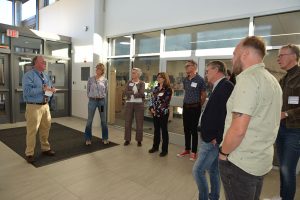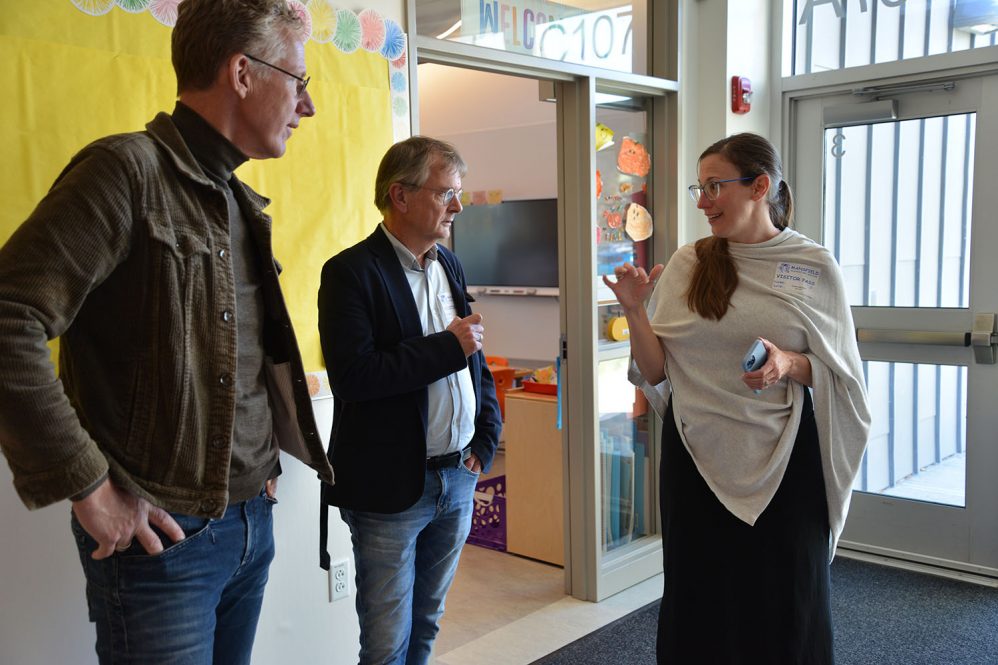Last month, the UConn Neag School of Education hosted a group of educators from the Netherlands to learn more about implementing Positive Behavior Interventions and Supports (PBIS) in the classroom.
The visit consisted of presentations from Neag School and Dutch educators, sharing what they have learned about PBIS and how they have incorporated them into their teaching, followed by visits to Mansfield Elementary and Middle schools, E.B. Kennelly School in Hartford, and Cedarhurst School in Hamden, all of which successfully incorporated PBIS into their lessons and routines.
The Dutch educators then wrapped up their U.S. visit by joining educators from the Neag School in attending the National PBIS Leadership Forum in Chicago, Illinois, to learn more about the application and evolution of PBIS on a broader scale.
“PBIS is a framework that allows schools and districts to design systems that work for kids and educators,” Neag School faculty member Brandi Simonsen said. “PBIS gives them a chance to really think about what core values they share, how they explicitly teach those, and how they teach routines. As kids are coming in and out of the pandemic, and home-school, and different contexts, PBIS has supported them making those transitions because they have a framework to teach and reinforce important social, emotional, and behavioral skills.”
PBIS is a framework that allows schools and districts to design systems that work for kids and educators. PBIS gives them a chance to really think about what core values they share, how they explicitly teach those, and how they teach routines. — Brandi Simonsen
The trip marks ten years since PBIS, an evidence-based framework that supports students’ behavioral, academic, social, emotional, and mental health, has been implemented in Dutch classrooms.
Simonsen is one of the researchers who shared a wealth of research and expertise with Dutch educators, which was integral in their implementation of the PBIS framework. She is the co-director of the National Technical Assistance Center on PBIS and co-director of the Neag School’s Center for Behavioral Education and Research (CBER).
Simonsen works with a team at the Windesheim University of Applied Sciences PBIS Expertise Center, which has been working over the past ten years to implement PBIS in Dutch schools and classrooms and connected her with Monique Nelen.
Nelen belongs to this team of researchers of School-Wide PBIS in Dutch Classrooms at the Windesheim University of Applied Sciences in Zwolle, Netherlands, and is one of the educators who visited to learn more about PBIS in the U.S.
“We’ve known each other for a long time, and she’s amazing,” Nelen said of Simonsen, who also served on Nelen’s Ph.D. advisory board at Radboud University in Nijmegen.
In 2017, Simonsen traveled to the Netherlands to visit several schools to see how PBIS is implemented there, share some examples of U.S. implementation, and present some of her research. She also had the honor of being the keynote speaker for their PBIS conference.

During this visit, talks of Dutch educators coming to Connecticut to see how PBIS is implemented here began.
“This recent trip has been years in the making,” said Simonsen, eager to reunite with the Dutch educators she has been collaborating with for so long.
Since Simonsen’s 2017 visit, her book, “Classwide PBIS,” has been translated into Dutch as “PBIS in de Klas,” which is used as a model for implementing PBIS in Dutch classrooms.
Nelen’s group was very excited to hear Simonsen and other educators on the recent panel speak about PBIS.
“Everyone is thrilled to be here,” Nelen said. “Most of us, for more than ten years, wanted to learn more about how you are doing things here, and to learn with Brandi and to exchange with other schools. To gather here with a group, discussing PBIS all day … and getting people out of their situation and into another environment, helps them in reflecting on what they are doing and what things they see that they can apply to their situation. So, I think we will all learn a lot.”
The U.S. is the epicenter of PBIS, it started here, so there’s a lot of knowledge and experience that we can take home with us. There’s much to be learned from the different cultures, so I am curious to see how PBIS is implemented here. — Noortje De Vríes
Noortje De Vríes, a director of the educational school teacher training for secondary, primary, and vocational teachers at the Windsheim University of Applied Sciences, echoed Nelen’s excitement: “The U.S. is the epicenter of PBIS, it started here, so there’s a lot of knowledge and experience that we can take home with us. There’s much to be learned from the different cultures, so I am curious to see how PBIS is implemented here.”
The panel at the Neag School began with presentations by Eben McKnight from the State Education Resource Center (SERC), and Kimberly Traverso from the Connecticut State Department of Education, discussing the gradual implementation of PBIS since the early 2000s in Connecticut schools.
McKnight shared that, currently, about 425 public schools in Connecticut have fully implemented PBIS and around 260 schools have incorporated at least one tier of PBIS.
Then the panel welcomed Nelen and Anita Blonk, an educational psychologist working on the Windsheim team to develop PBIS in Dutch Schools, who discussed implementing PBIS in the Netherlands to fit Dutch culture and educational standards.
For instance, a core tenet of PBIS is positive reinforcement through praise. Nelen shared that it is rare to give compliments in the Netherlands, so that expectation was new and unfamiliar to them.
However, after creating a consortium of educational partners who weighed in on what they think PBIS should look like in Dutch schools, Nelen and her team were able to develop their variation of PBIS that was more reflective of Dutch values and culture.
Nelen said their journey incorporating PBIS ended “happily ever after,” as there is now a Dutch PBIS expertise network, a PBIS conference each year, and a system for recognizing schools as being PBIS schools. The Netherlands has about 400 schools working with PBIS, including elementary, secondary, and vocational schools.
“When we first came to the U.S., we were learning from the great gurus and founding fathers of PBIS,” Nelen said. “Now, I think we have come to a level where we also have something to share. That feels great!”
Both parties hope the connection they’ve created over the past ten years is not going anywhere anytime soon.
“We started talking about an opportunity for American educators to visit the Netherlands,” Simonsen said. “We would love to have it be a broader partnership and exchange, so we’re hoping our connection grows.”
Nelen shared this sentiment: “It would be great for Brandi and her colleagues to come to the Netherlands. I think we will continue working together, and we have even discussed doing some research together and discussing how you do the research here and how we can use those methods in the Netherlands.”
To view photos from the event, visit the Neag School of Education’s Facebook page.



